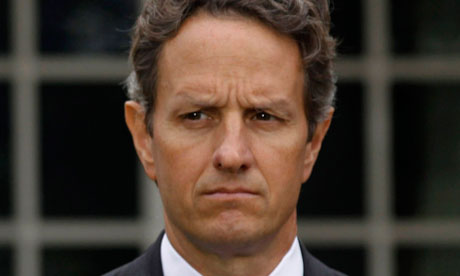Bailing out the US financial system looked like "giving aid to the arsonists", outgoing treasury secretary Tim Geithner said on Friday, his last day in the job.
In a series of interviews to mark his departure, Geithner discussed his central role in the financial crisis. He told the New Republic he understood public anger that no senior bankers have been charged following the biggest financial crisis in living memory.
"My own view was that it was going to be very hard, if not impossible to design a financial rescue that was going to be effective in protecting all the innocent victims hit by the crisis and still satisfy the completely understandable public desire for justice and accountability. Those things were in direct and tragic tension, never resolvable at that time," he said.
Geithner was confirmed as 75th US treasury secretary on January 26, 2009, in the midst of the financial crisis. Given the massive bailouts of the financial sector that he oversaw, Geithner told the Wall Street Journalpublic anger was inevitable. "You look like you're giving aid to the arsonist," he said. But he predicted history would judge the financial rescue as effective and less costly than initially anticipated.
As secretary Geithner does not oversee criminal prosecutions, but the Treasury Department has a regulatory role and Geithner was also one of Wall Street's top regulators in his previous job as head of the New York Federal Reserve.
Geithner told the WSJ that the enforcement response was "still unfolding". He added that "a huge part of what happened across the system was just a mixture of ignorance and greed, or hope over experience, and not illegal. Most financial crises are not caused by fraud or abuse. They're caused by people taking on risks they don't understand, too much risk."
Geithner has been criticised for being too close to Wall Street while Obama has been attacked by bankers for his outspoken criticism of financiers.
Geithner told the New Republic he "never quite understood why the financial community took such offense at what was such moderate rhetoric relative to what we have seen in other periods in history."
The treasury secretary said high unemployment was still one of the worst legacies of the financial crisis. "That's the unavoidable, terrible, tragic legacy of a financial crisis this bad," he said.
He said there was "very substantial room" for fiscal policy to bring the rate of unemployment down but that would be easier to do "if it was accompanied by some credible long-term plan to bring down future deficits."
Geithner said the response to the 2008 financial crisis significantly reduced the "probability and the intensity of crises for a long period of time." But another crisis is inevitable, he suggested. "I know that markets over time will find their way around those things, and memories will fade. But if we're lucky that will take a long time," he said.
The Treasury Department put out a blog post on Friday detailing 75 facts about its 75th secretary. Geithner spent more than 167 hours testifying before Congress, appearing at 67 hearings during his tenure. He logged 600,000 miles on international trips and his signature appears on 17bn notes.
Asked what he will do next Geithner said he had no immediate plans. "I've been doing this for a long time. I'm going to take a long time to think about what I do next. As I should," he said.
Obama has nominated Jack Lew, White House chief of staff, to replace Geithner.
"Someone said that the country, this country today, now longs for a time when most Americans will, once again, have no idea who the Secretary of the Treasury is. But Jack won't have that luxury. He'll still face some of the toughest challenges anyone could face in economic policy.
And he will be great at it," Geithner said in his parting speech last week
And he will be great at it," Geithner said in his parting speech last week

No comments:
Post a Comment